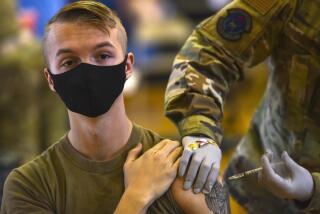Gulf War Veterans Seek Restitution for Ailments
- Share via
LONDON — Ian Hill, a registered nurse and army reservist, played rugby, rough-and-tumble, until he was 43. At 44, he volunteered for army service during the Persian Gulf War and was in charge of the operating room at a British military hospital in Saudi Arabia.
“Now I’m totally disabled, a 50-year-old in the body of an 80-year-old,” Hill said. “My central nervous system has broken down, my immune system is shot, I have inflammation of the brain. I need 24-hour care.”
Like more than 1,100 other British veterans of the 1991 Gulf War who are known to be ill, Hill believes that he is the victim of friendly medical fire: a cocktail of vaccines administered by British forces against chemical warfare.
In Britain, as in the U.S., veterans are campaigning for recognition of their ailments as service-connected and seeking compensation for them. There is growing public awareness as well as the prospect of political support for the first time.
“I think justice will come, but there’s still a lot of pushing to do,” said Hill, who is president of the largest association of British forces inoculated for the war.
Hill said that lobbying by veterans has won a promise from the opposition Labor Party, strongly favored to win elections in the spring, to create Britain’s first government department of veteran affairs.
In the meantime, the British Defense Ministry expects a decision in the next few weeks from a blue-ribbon medical council on the best way to continue research.
Lawyers representing the sick veterans say they will not wait for the official results: In January, they will launch an independent medical study.
“The results may give us a start in proceeding against the [Defense Ministry] for personal injury compensation,” attorney Joanne Masters said.
“As many as 4,000 veterans may have illnesses triggered by toxic reaction to inoculations that included vaccines against anthrax and plague,” said Tony Flint, a regional coordinator for the Assn. of Gulf War Veterans and Families that Hill leads. “Many still serving are not willing to come forward because it would ruin their careers.”
More than 100 Gulf vets have died of ailments that survivors ascribe to the inoculations. In all, Flint said, about 2% of the 51,000 British troops assigned to the Gulf are affected by the initial inoculations and subsequent doses of Nerve Agent Pre-Treatment Sets tablets.
“That’s about the same percentage as for the Americans, but in the United States money has been appropriated and there is a Veterans Administration. Here, we have neither,” Flint said.
In October, the British government acknowledged that a relative handful of troops in the Gulf may have been exposed to potentially damaging organophosphate pesticides. But it is not convinced that there may be an identifiable, broader cause.
“We are keeping an open mind, but so far the idea that there may be a Gulf War illness is unproved,” a senior Defense Ministry spokesman said.
*
Flint, who said he had 13 inoculations in one week, notes that there appears to be no evidence of major post-Gulf illnesses among French troops, who did not receive the vaccine cocktail.
The veterans exhibit a broad range of symptoms including chronic fatigue, muscle weakness, sleeplessness, depression, asthma, headaches and skin complaints. Birth defects are also more common among the children of Gulf vets than in the general population, the veterans say.
More to Read
Sign up for Essential California
The most important California stories and recommendations in your inbox every morning.
You may occasionally receive promotional content from the Los Angeles Times.













